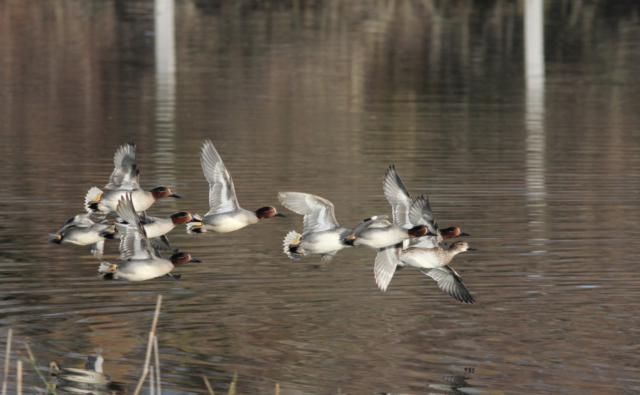 Danièle Dugré is the Coordinator of the Coalition Biodiversité : Non au Bti, a coalition from Quebec whose goal is to enlighten citizens on the effects of using Bti to control biting insects.
Danièle Dugré is the Coordinator of the Coalition Biodiversité : Non au Bti, a coalition from Quebec whose goal is to enlighten citizens on the effects of using Bti to control biting insects.
In this interview, she responds to questions from the Tour du Valat concerning Bti and mosquito eradication, with Christiane Bernier, the regional manager of the group in Mauricie
-
What environmental protection activities are you carrying out in Quebec?
Our coalition is made up of several regional groups that fight against the application and spraying of Bti in Quebec. Bti has been used for dozens of years in Quebec with no health benefits. Officially, 50 municipalities have a control program that targets biting insects for reasons of comfort, several of which are in touristic regions. The general public was not at all informed about this issue. For the first time in Quebec, in 2019 citizens from the Hautes-Laurentides region sounded the alarm on the social networks, because they didn’t want the biodiversity of their region to be disturbed or partly destroyed by Bti. There has subsequently been a snowball effect and now there are very active groups in several regions of Quebec that are informing people about Bti’s impacts on the environment and encouraging them to reject Bti. Our work is thus to raise the awareness of citizens, journalists, elected officials, scientists, and politicians by informing them and demonstrating that Bti has negative impacts on biodiversity, contrary to the message spread by the Bti industry. We also want government to require that the precautionary principle be applied.
-
How did you learn about the Tour du Valat research on mosquito control and how has it been useful for you?
Following our initial questions about the signification of “organic Bti mosquito control” (in Quebec, we use this expression rather than “mosquito eradication”), we did research on the social media and found your website. All of your publications on Bti taught us what this insecticide really is and helped us to learn more so that we could better explains the stakes involved in using it. Since no study has been conducted up until now in Quebec on the impacts of Bti, we are extremely grateful for having gained access to scientific data from an independent and neutral organization. Up until now, in Quebec, as elsewhere too, the information on Bti was produced by the companies that sell and apply it! It was time for that to change. So, your research is extremely relevant and a source of inspiration for us! Even a great number of our scientists in Quebec need it.
It’s Brigitte Poulin’s conference on Bti in Montreal on June 5, 2019 that drew Christiane Bernier’s attention to this insecticide, and thus to the Tour du Valat: “I couldn’t believe that I’d never heard of this product that’s applied in my city, and that the local inhabitants pay for without ever being consulted, except for a poll in 2005. A poll that showed a lack of interest by the local inhabitants, nevertheless the biting insect control program was started in secret in 2008.”
-
Do you think it’s important for researchers to spend time on popularizing science?
Yes, it’s extremely important so that everyone can understand what we’re talking about when we explain where and how Bti has an impact. Our target audience is especially the general public, people who are not scientists, and who in general have very little technical or scientific knowledge about larvicides and the environments in which they are used. Scientific popularization means communication adapted to the people concerned, who often have never had to worry about the impacts of an insecticide on their immediate environment.
Popularizing science is a crucial activity. Social acceptability has become increasingly important in Quebec. For a project to be socially acceptable, the local inhabitants must be consulted. And for the local inhabitants to make a good decision, they must know what is at stake in the project. Since most people don’t have a background in science, the information given must explain the basic issues, and be short and simple. Decisions concerning the common good are made on such a basis.
There is also a cruel lack of time; people have little time to devote to every subject, and there are so many subjects out there grabbing for our attention. Reading complex studies, often in English, can be laborious for the average person.
-
Based on your experience what are the most effective tools for making research results accessible to the greatest number of people?
We believe that in today’s world, we have to adapt our communication to the social networks with attractive pictures of birds, dragonflies, and other animals, with very short video clips, charts, and short articles that are easy to understand. We’re making a brochure that we’d like to distribute in the regions affected and are trying as hard as possible to present the vital information in a few words and several images. In addition, we believe that it would also be relevant to regularly broadcast short, informative webinars on the social networks aimed at non-scientists, and others that are more complete for an audience that is more conscious of the issues and has more scientific expertise. It will also be necessary to send press releases on a regular basis to the specialized press as well as to more general publications. With these press releases, we’ll be able to react quickly to all the articles produced by the Bti industry whose only goal is to scare people. The ideal solution would be an international data bank of press releases, articles, videos, and photos that could be modified according to the region, the occasion, and the new discoveries made.



